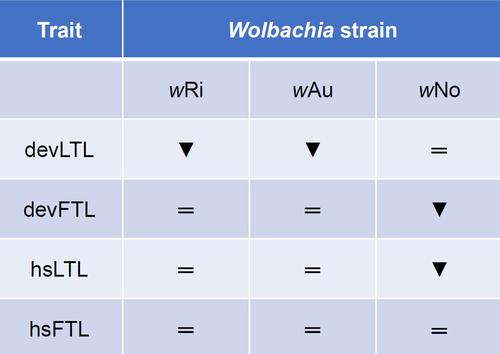当前位置:
X-MOL 学术
›
Environ. Microbiol.
›
论文详情
Our official English website, www.x-mol.net, welcomes your
feedback! (Note: you will need to create a separate account there.)
Wolbachia infection negatively impacts Drosophila simulans heat tolerance in a strain‐ and trait‐specific manner
Environmental Microbiology ( IF 4.3 ) Pub Date : 2024-04-01 , DOI: 10.1111/1462-2920.16609 Liam F Ferguson 1 , Perran A Ross 1, 2 , Belinda van Heerwaarden 1
Environmental Microbiology ( IF 4.3 ) Pub Date : 2024-04-01 , DOI: 10.1111/1462-2920.16609 Liam F Ferguson 1 , Perran A Ross 1, 2 , Belinda van Heerwaarden 1
Affiliation

|
The susceptibility of insects to rising temperatures has largely been measured by their ability to survive thermal extremes. However, the capacity for maternally inherited endosymbionts to influence insect heat tolerance has been overlooked. Further, while some studies have addressed the impact of heat on traits like fertility, which can decline at temperatures below lethal thermal limits, none have considered the impact of endosymbionts. Here, we assess the impact of three Wolbachia strains (w Ri, w Au and w No) on the survival and fertility of Drosophila simulans exposed to heat stress during development or as adults. The effect of Wolbachia infection on heat tolerance was generally small and trait/strain specific. Only the w No infection significantly reduced the survival of adult males after a heat shock. When exposed to fluctuating heat stress during development, the w Ri and w Au strains reduced egg‐to‐adult survival but only the w No infection reduced male fertility. Wolbachia densities of all three strains decreased under developmental heat stress, but reductions occurred at temperatures above those that reduced host fertility. These findings emphasize the necessity to account for endosymbionts and their effect on both survival and fertility when investigating insect responses to heat stress.
中文翻译:

沃尔巴克氏体感染以菌株和性状特异性方式对模拟果蝇的耐热性产生负面影响
昆虫对气温升高的敏感性很大程度上是通过它们在极端高温下生存的能力来衡量的。然而,母系遗传的内共生体影响昆虫耐热性的能力却被忽视了。此外,虽然一些研究已经解决了热量对生育力等性状的影响,当温度低于致命的热极限时,生育力可能会下降,但没有一个研究考虑到内共生体的影响。在这里,我们评估了三个方面的影响沃尔巴克氏体菌株( w里, w金和w否)关于生存和生育能力模拟果蝇在发育过程中或成年后暴露于热应激。的效果沃尔巴克氏体感染对耐热性的影响通常很小并且具有性状/品系特异性。只有w没有感染会显着降低热休克后成年男性的存活率。当在发育过程中暴露于波动的热应激时, w里和w Au 菌株降低了卵到成虫的存活率,但仅w没有感染会降低男性的生育能力。沃尔巴克氏体在发育热应激下,所有三种菌株的密度均下降,但在高于宿主生育力降低温度的情况下,密度会下降。这些发现强调,在研究昆虫对热应激的反应时,有必要考虑内共生体及其对生存和生育力的影响。
更新日期:2024-04-01
中文翻译:

沃尔巴克氏体感染以菌株和性状特异性方式对模拟果蝇的耐热性产生负面影响
昆虫对气温升高的敏感性很大程度上是通过它们在极端高温下生存的能力来衡量的。然而,母系遗传的内共生体影响昆虫耐热性的能力却被忽视了。此外,虽然一些研究已经解决了热量对生育力等性状的影响,当温度低于致命的热极限时,生育力可能会下降,但没有一个研究考虑到内共生体的影响。在这里,我们评估了三个方面的影响沃尔巴克氏体菌株( w里, w金和w否)关于生存和生育能力模拟果蝇在发育过程中或成年后暴露于热应激。的效果沃尔巴克氏体感染对耐热性的影响通常很小并且具有性状/品系特异性。只有w没有感染会显着降低热休克后成年男性的存活率。当在发育过程中暴露于波动的热应激时, w里和w Au 菌株降低了卵到成虫的存活率,但仅w没有感染会降低男性的生育能力。沃尔巴克氏体在发育热应激下,所有三种菌株的密度均下降,但在高于宿主生育力降低温度的情况下,密度会下降。这些发现强调,在研究昆虫对热应激的反应时,有必要考虑内共生体及其对生存和生育力的影响。
















































 京公网安备 11010802027423号
京公网安备 11010802027423号